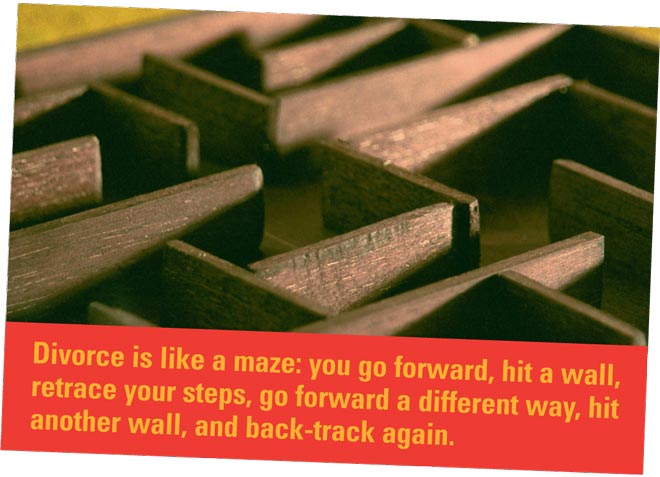by Kay Atchison, Licensed Clinical Social Worker
Amy is a 41-year-old mother of two. She works part-time as a paralegal and is very active in her church. She was married to Frank for 16 years. She had aspirations to attend law school, but decided to get married and support the family while her husband finished his medical training. They worked as a team and were truly committed to each other. They had what seemed to be a very happy and fulfilling life. Great kids, good health, great neighbors and friends, strong church community and a healthy marriage.
For her 40th birthday Frank planned a surprise trip to Hawaii. He had arranged everything––flights, hotels, childcare, time off from her job, all the details. They had a fabulous trip filled with relaxation, romance, and many iterations of “I love you.”
Six months later they were in a counselor’s office. Frank wanted a divorce.
Amy’s reaction? Shock, disbelief, confusion, paralyzing fear. She was so devastated she could barely function. She was in a nightmare, constantly preoccupied with the “what went wrong” questions. Amy’s friends started to worry that she was losing it. Amy herself started to believe that Frank was crazy––and maybe she was going crazy, too.
WAS AMY GOING CRAZY?
NO, she was not. She was in a major, disruptive, life-altering process called divorce.
People don’t warn you about how crazy-making extreme stress can be. Be forewarned! The emotional impact of a divorce can be intense, and has lots of highs and lows––upside down and sideways turns as well. Like a roller coaster ride for which you didn’t buy a ticket, the emotions that emerge during divorce can come and go unpredictably. Hang on. The divorce process has a beginning, middle and end. Eventually the scary ride will stop.
As reality sinks in, clear and logical thinking may become difficult, if not impossible. While one part of your brain may know that divorce is for the best (or at least inevitable), the other part may be a jumbled mess of emotions––sadness about your failed marriage, anger at your spouse, relief from living in tension, thoughts about what you could have done to save your relationship, fear for the future. Your feelings may change from morning to afternoon, or hour-by-hour. Divorce is a highly personal experience; there’s no way to predict exactly how you will respond.
If you did not initiate your divorce, and especially if it was a surprise, you’ll probably experience more intense emotions than your spouse. But even if you initiated your divorce or if you’re anxious to be single again, at some point during the divorce process you will probably feel some strong emotions too. The more aware you are of your emotions and understand your feelings, the better you’ll be able to put your emotional responses in perspective, handle in a positive way, and prevent your emotions from derailing your divorce process.
WHAT IS GOING ON?
We’re talking about the death of a relationship, the most intimate relationship there is. Even if you no longer want to be married, you will still experience some amount of loss. That loss may include extended family, friends, your home, or your economic status. And a loss of anything that is especially important in life, including the loss of a marriage, must be grieved.
Elisabeth Kubler-Ross, M.D., wrote a landmark book about grief and loss called On Death and Dying. She explains that when someone loses a loved one, the recovery progresses through a series of stages – stages which also apply to divorce.
- Shock and Denial
- Bargaining
- Anger
- Sorrow
- Depression
- Understanding and Acceptance
These stages don’t necessarily occur in order; each person moves through them in a unique way. And while understanding the stages is useful, it won’t make your pain go away. But knowing what to expect, realizing that what you’re feeling is normal and that others have gone on to build fulfilling lives, can be very reassuring.
WHAT ARE THE STAGES?
Early on, you’ll probably wonder what to expect––and how to accelerate or bypass the painful parts. Unfortunately, recovery from divorce is not an express elevator from the basement of grief to the top floor of happiness. It’s more like a maze: you go forward, hit a wall, retrace your steps, try a different way, hit another wall, and back-track again before finding your way out.
DIVORCE!
Amy’s total disbelief is a typical example of someone blindsided by a life-changing event. She walked through the days thinking that this was not happening to her.
Denial is akin to the shock response your body goes through when you’re physically injured. There’s numbness in the injured area. It may be difficult to comprehend the idea that your marriage is actually ending; you try to tell yourself it’s all just a silly misunderstanding. You may find yourself questioning your judgment and the assumptions about your marriage and your spouse.
I DON’T DESERVE THIS!
Amy’s anger emerged slowly. She vacillated between disbelief and bargaining, grasping for a sense of control. Her anger rose as she realized the magnitude of Frank’s unilateral decision. She felt betrayed and cheated. Angry thoughts kept her awake at night and she was anxious a lot.
Frank experienced anger as well. He was angry when he realized the marriage was over: “Why hadn’t this worked out?” He was frustrated at Amy’s surprise: “Couldn’t she see what a lie we’d been living?”
Anger is a normal response to the ending of your marriage. You may be angry with your spouse, yourself, your family, neighbors, the world. Expressing it can help relieve some of the pressure, but managing it is critical. If anger permeates areas of your life where it doesn’t belong, or is out of proportion, you may need help putting things in perspective.
I CAN’T TAKE THIS ANY MORE; WILL IT EVER/NEVER END?
Amy was feeling powerless. The decision was out of her hands. She was tired, lethargic, and frequently tearful. Sometimes the week between counseling sessions was too much and she started attending a divorce support group. It was immensely helpful; these people knew exactly how she felt.
It was a surprise to Frank how much he missed Amy. Simple things like coming home to an empty house and eating alone were hard. Many of “their” friends distanced themselves because he had “started it.” Sometimes he questioned the whole thing.
Depression is a normal response to a difficult life situation. The reality of the divorce is clear. You may think there’s nothing you can do to relieve the pain, you’ll never have a loving relationship, never be financially stable, never be happy again. If your depression won’t go away or gets worse, seek the help of a professional. There are ways to get through these tough times.
I PROMISE, I’LL NEVER _________ AGAIN
Amy’s struggle with her sadness and pain lead her to approach Frank and promise to control her “snippy comments and periodic outbursts.” If Frank would work towards reconciliation, she would attend anger management classes.
Bargaining is trying to find a simple solution to a complex problem. In desperation, you promise to do just about anything to keep your marriage together. If you are tempted to promise your spouse the world to save your marriage, talk to someone, a trusted friend or counselor, to get an outsider’s perspective.
MAYBE IF WE HAD TALKED, REALLY TALKED . . .
Having moved farther away from their anger, Amy and Frank each wondered how their ways of behaving and talking had led to the demise of their relationship. But it seemed that all attempts to learn new ways of talking seemed futile. Both came to the same difficult conclusion: sometimes love is not enough.
Sorrow is another normal response to the end of your marriage. You may be quite sad over the realization that the dreams and hopes you had for your marriage won’t be realized. You may feel remorse about the impact on your children. Realize that no situation lasts forever; use what you’ve learned in this last relationship as you move on.
I WILL TRY AND MAKE THE MOST OF MY LIFE GOING FORWARD.
Eventually, Amy started thinking seriously about what she wanted for her life. She began to feel a certain freedom: she could buy the car of her dreams or move to the coast. She thought about the course of her marriage and how she had neglected to attend to the relationship––her own needs as well as Frank’s.
Frank, too, became aware that he was frequently distant and preoccupied with work, golf, and sailing. He “hid” from Amy. No wonder she would lash out at him; it was an effective way to get his attention.
Acceptance of your divorce will promote some degree of peace in your life. You may continue to experience a range of emotions, but over time the intensity will dissipate. Your energy level will climb and your enthusiasm for life will return.
A SUCCESSFUL ENDING
Amy and Frank survived, bruised but healing. Each had negotiated the stages of grief and mourning, and gained a new sense of their abilities to cope with problems of daily life and personal well being. Shifting from being a married person to a single person had been a sometimes painful process of self-discovery. But the result was a new sense of competency and control. By getting on with their lives, Amy and Frank were able to successfully conclude the divorce process.
LETTING YOUR EMOTIONS GO UNCHECKED CAN:
- Negatively effect your role as a parent and at work
- Sap your energy at the time you need it most
- Prevent you from recognizing how you contributed to the breakdown of the marriage
- Drive away your friends and family
WHAT STRATEGIES CAN BE USED TO GET THROUGH THE TOUGH TIMES?
- Keep a journal of your thoughts and feelings.
- Give yourself permission to cry.
- Reach out to close friends and family members.
- Be kind to yourself – focus on yourself instead of on your spouse or marriage problems.
- Get adequate sleep – not too much, not too little.
- Balance eating.
- Begin/maintain an exercise program.
- Refocus on your career.
- Volunteer – boost your self-esteem and distract from your problems.
- Get outside – enjoy and appreciate nature.
- Spend more time with your children.
- Spend time with friends and family who have a positive influence.
- Think about counseling to learn coping skills, establish goals, and provide positive support as you move forward in reestablishing your life.
- Try divorce support groups to meet people who understand what you’re going through and can offer emotional support––and offer practical advice on things like financial burdens, family problems and raising children.
HOW LONG WILL THIS TAKE?
The length of the grieving process is different for everyone. Most adults take about two years to adapt to the changes separation and divorce bring; for some it can take just a few months. In any case, adjusting to divorce takes time. Value each step forward in reestablishing your life – small ones can be as significant as giant leaps. The key is to make wise, informed decisions about how you’re going to live and what you’re going to believe about yourself.






